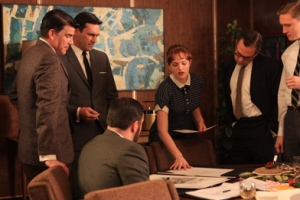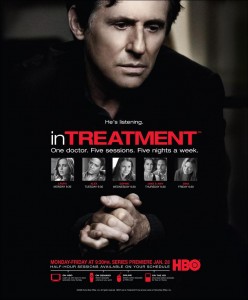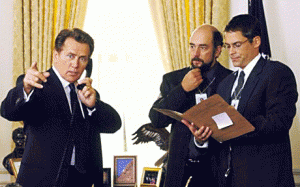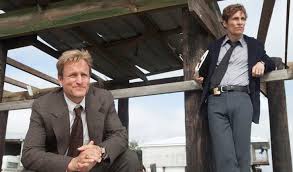 In the second episode of Season One of Mad Men, one of the copywriters is showing the agency to a new secretary, trying to impress her: “You know . . . there are women copywriters!” he claims. – “Good ones?” – “Sure,” he says. “I mean, you can always tell when a woman is writing copy. But sometimes she may be the right man for the job, you know?” Not much has changed since the days depicted in Mad Men. Or at least, not enough. This is still a man’s world – and sometimes a woman will get a writing job not because she is “the right man for the job” but because she is a woman.
In the second episode of Season One of Mad Men, one of the copywriters is showing the agency to a new secretary, trying to impress her: “You know . . . there are women copywriters!” he claims. – “Good ones?” – “Sure,” he says. “I mean, you can always tell when a woman is writing copy. But sometimes she may be the right man for the job, you know?” Not much has changed since the days depicted in Mad Men. Or at least, not enough. This is still a man’s world – and sometimes a woman will get a writing job not because she is “the right man for the job” but because she is a woman.
Tag: television
So what is the big difference between the film and TV industries? And why is American TV so successful? There are surely as many theories as there are shows, and they are probably all right. Still, allow me to add one more, based on one very important difference that I believe has been overlooked till now despite its enormous significance.
TV is known as a better place for writers than any of the other dramatic media, with the sole exception of the theater, of course. Besides, TV drama is nowadays so highly regarded that it is already changing some of the old rules regarding old industry traditions. The crossover of the boundary between cinema and TV, whereby writers can move once again from one medium to the other, with greater ease, is one of the changes. It remains to be seen whether the crossover experiment will affect the writer’s importance in other media too – especially in film.
 So how can you stay true to yourself as a writer, especially when one is supposed to be imitating another writer’s voice? For one thing, one can stop chasing fads or writing what one think the showrunner might want to see. Jane Espenson, who has written for Buffy the Vampire Slayer, Battlestar Galactica and Game of Thrones and has also created her own Web TV show, Husbands, talks to me about how important it is to trust your own instincts and your own good taste. She is not the only one: Jenny Bicks encourages “writing what you want to write, going towards the love” and Tom Fontana goes as far as to very simply state that “being successful is being faithful to oneself.”
So how can you stay true to yourself as a writer, especially when one is supposed to be imitating another writer’s voice? For one thing, one can stop chasing fads or writing what one think the showrunner might want to see. Jane Espenson, who has written for Buffy the Vampire Slayer, Battlestar Galactica and Game of Thrones and has also created her own Web TV show, Husbands, talks to me about how important it is to trust your own instincts and your own good taste. She is not the only one: Jenny Bicks encourages “writing what you want to write, going towards the love” and Tom Fontana goes as far as to very simply state that “being successful is being faithful to oneself.”
By Christina Kallas
 One thing’s for sure: people don’t go to writing to be rewritten. But they still are, first and foremost by the showrunner. The showrunner is the writer who tells the writers what to do, and who will eventually do it herself.
One thing’s for sure: people don’t go to writing to be rewritten. But they still are, first and foremost by the showrunner. The showrunner is the writer who tells the writers what to do, and who will eventually do it herself.
So should a showrunner polish the final draft of every episode to preserve the “voice” of the series, or should each individual writer be allowed to use their voice to bring out new sides to the characters and the series?
By Christina Kallas
 Paddy Chayefsky once wrote that “television is an endless, almost monstrous drain” (The Television Plays, 1955.) And he continued: “How many ideas does a writer have? How many insights can he make? How deep can he probe into himself, how much energy can he activate?” Furthermore, “he (the writer) has no guarantee that his next year will be as fruitful. In fact most writers live in a restrained terror of being unable to think up their next idea. Very few television writers can seriously hope to keep up a high-level output for more than five years.”
Paddy Chayefsky once wrote that “television is an endless, almost monstrous drain” (The Television Plays, 1955.) And he continued: “How many ideas does a writer have? How many insights can he make? How deep can he probe into himself, how much energy can he activate?” Furthermore, “he (the writer) has no guarantee that his next year will be as fruitful. In fact most writers live in a restrained terror of being unable to think up their next idea. Very few television writers can seriously hope to keep up a high-level output for more than five years.”
By Christina Kallas
 The comparison with a novel or with watching a very long movie is a good one for yet another reason: serialization means that you cannot watch the episodes in whichever order they reach you. You have to watch the whole season as if you were watching a 12-hour movie. Terence Winter, creator of Boardwalk Empire and one of the writers for The Sopranos) talks about how the effort still goes towards ensuring that each episode may stand alone, as if it were a mini-movie. So when you just happen to watch this one it still has its own beginning, middle and end, and it makes sense. But it’s like one chapter in a book. To really appreciate it you have to watch the whole series, as you would read a book.
The comparison with a novel or with watching a very long movie is a good one for yet another reason: serialization means that you cannot watch the episodes in whichever order they reach you. You have to watch the whole season as if you were watching a 12-hour movie. Terence Winter, creator of Boardwalk Empire and one of the writers for The Sopranos) talks about how the effort still goes towards ensuring that each episode may stand alone, as if it were a mini-movie. So when you just happen to watch this one it still has its own beginning, middle and end, and it makes sense. But it’s like one chapter in a book. To really appreciate it you have to watch the whole series, as you would read a book.


